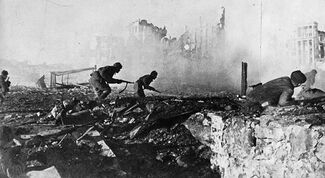Second Civil War of Fravina: Difference between revisions
No edit summary |
No edit summary |
||
| Line 113: | Line 113: | ||
}} | }} | ||
The '''Second Civil War of Fravina''' was a civil war fought in [[Fravina]] from 1939 to 1948 | The '''Second Civil War of Fravina''', also called the '''Rose Revolution''', was a civil war fought in [[Fravina]] from 1939 to 1948 between supporters of Brigadier General [[Joseph Peretti]] and supporters of Lieutenant Colonel [[Jacques de Mercy]], resulting in the formation of the [[Fravina|Second Republic of Fravina]]. The war began on 7 May 1939 with the [[East Orléans Army Mutiny]], led by de Mercy, and the [[Port de Orléans Riots of 1939]]. | ||
The origins of the war can be traced back to the death of [[Premier of Fravina|Premier]] [[Lewis M. Nichols]] and the succession of his office. Both De Mercy and Peretti wanted to succeed Nichols, and when Peretti took the office, de Mercy mutinied. Those for de Mercy were colloquially referred to as the [[Roses (Fravina)|''Roses'']], and were mainly composed of socialists and so-called [[Green Liberals (Fravina)|Green Liberals]]. Those for Peretti were colloquially referred to as the [[Irises (Fravina)|''Irises'']], and were mainly composed of fascists and so-called [[Blue Liberals (Fravina)|Blue Liberals]]. | The origins of the war can be traced back to the death of [[Premier of Fravina|Premier]] [[Lewis M. Nichols]] and the succession of his office. Both De Mercy and Peretti wanted to succeed Nichols, and when Peretti took the office, de Mercy mutinied. Those for de Mercy were colloquially referred to as the [[Roses (Fravina)|''Roses'']], and were mainly composed of socialists and so-called [[Green Liberals (Fravina)|Green Liberals]]. Those for Peretti were colloquially referred to as the [[Irises (Fravina)|''Irises'']], and were mainly composed of fascists and so-called [[Blue Liberals (Fravina)|Blue Liberals]]. | ||
Revision as of 23:01, 25 April 2023
This article is incomplete because it is pending further input from participants, or it is a work-in-progress by one author. Please comment on this article's talk page to share your input, comments and questions. Note: To contribute to this article, you may need to seek help from the author(s) of this page. |
| Second Civil War of Fravina | ||||||||
|---|---|---|---|---|---|---|---|---|
 Second Battle of Cartiercourt, 1945 | ||||||||
| ||||||||
| Belligerents | ||||||||
|
1939-1940 |
1939-1940 | |||||||
|
1940-1944 Supported by |
1940-1944 Supported by |
1940-1944 | ||||||
|
1944-1948 Supported by |
1944-1948 Supported by | |||||||
| Commanders and leaders | ||||||||
| Strength | ||||||||
|
534,000 (peak) 4,575 (peak) |
1,147,000 (peak) 18,244 (peak) |
| ||||||
| Casualties and losses | ||||||||
|
|
|
| ||||||
| 650,000–700,000 total casualties, including civilians and non-combatants | ||||||||
The Second Civil War of Fravina, also called the Rose Revolution, was a civil war fought in Fravina from 1939 to 1948 between supporters of Brigadier General Joseph Peretti and supporters of Lieutenant Colonel Jacques de Mercy, resulting in the formation of the Second Republic of Fravina. The war began on 7 May 1939 with the East Orléans Army Mutiny, led by de Mercy, and the Port de Orléans Riots of 1939.
The origins of the war can be traced back to the death of Premier Lewis M. Nichols and the succession of his office. Both De Mercy and Peretti wanted to succeed Nichols, and when Peretti took the office, de Mercy mutinied. Those for de Mercy were colloquially referred to as the Roses, and were mainly composed of socialists and so-called Green Liberals. Those for Peretti were colloquially referred to as the Irises, and were mainly composed of fascists and so-called Blue Liberals.
Following the Fravina Indigenous Congress of 1940, the leaders of various Fravina indigenous groups chose to support the Roses. In opposition to this, various other indigenous leaders held the Fravina Northern Indigenous Conference of 1941, choosing to support the Irises.